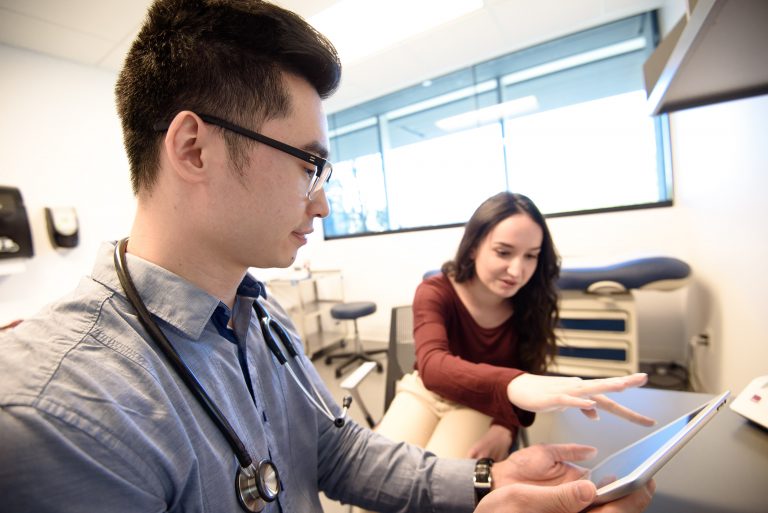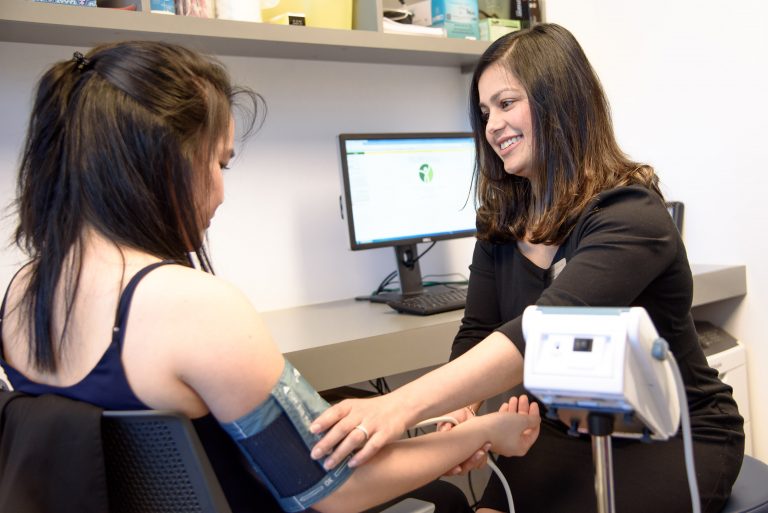Did you know that cardiovascular disease is the second leading cause of death in Canada? Did you know it is the leading cause of death worldwide?
To challenge this scenario, UBC Pharmacists Clinic and UBC Human Resources’ Health, Wellbeing & Benefits engaged in a unique collaboration to successfully encourage faculty and staff to take care of their heart health through taking preventative steps.
The partnership began in February 2014 at the Heart Health Traveling Health Fair, when over 500 UBC faculty and staff received education and heart health measurements. Results showed that one in eight participants were at an intermediate or high risk for cardiovascular disease, and 37 per cent of people aged 55 and older had increased risk.
Moreover, 38 per cent of the participants were not aware of their risk and 62 per cent would not have otherwise thought to talk to a health care professional about their heart health.
Based on these results, the Cardiovascular Assessment and Medication Management by Pharmacists at the UBC Site (CAMMPUS) project launched in 2015 with the goal of evaluating the impact of a pharmacist-led service at UBC. This was the first prospective study of its kind to measure and demonstrate the benefit of pharmacist participation in a Canadian workplace-based, cardiovascular disease risk reduction program.
“CAMMPUS reflects UBC’s capacity to significantly improve health and wellbeing in the workplace, while also pursuing research excellence,” said Natasha Malloff, Director of Health, Wellbeing & Benefits at UBC. “This was possible because of the strong collaborative relationship built between Human Resources and the Pharmacists Clinic.”
Employers have an opportunity to reduce heart health risk
Participants underwent a baseline assessment by a clinic pharmacist, which included measurements of weight, height, waist circumference, blood pressure and blood lipid profile, as well as an analysis of the person’s lifestyle habits, family history and use of medication. After that, they received customized health care plans, guidance and had their progress monitored through follow-up appointments.
A total of 178 faculty and staff completed 12 months of standardized service designed to guide health improvement. This group observed a reduction of 8.5 per cent in the risk of cardiovascular disease. Considering only participants with the highest level of risk to start, the reduction was higher: 18.1 per cent.
The intervention revealed that employers play an essential role in improving the health and wellbeing of their employees.
“For me, the greatest thing was learning more about heart health and what impacts it. I think that knowledge is key to beginning to make change,” said a participant. (Patient names are confidential and cannot be disclosed.)
“I felt I was still in control of my wellbeing but being properly guided on choices I have to make,” said another participant.
Overall, participants reported better understanding of their health information, feeling more confident and feeling empowered to make lifestyle changes to improve their cardiovascular health.

For Barbara Gobis, Director of the Pharmacists Clinic in the Faculty of Pharmaceutical Sciences, pharmacists have a clear role in preventing those problems. “Most cardiovascular diseases have cardiovascular risk factors that can be managed or modified, like high blood pressure, diabetes, physical activity levels, as well as lifestyle choices such as smoking. As our research shows, a structured intervention led by pharmacists can have significant positive results in the workplace,” she said.
CAMMPUS 2.0
To evaluate how participants have maintained their new health habits, the Pharmacists Clinic and the Health, Wellbeing & Benefits team are back together working on CAMMPUS 2.0.
Faculty and staff who completed CAMMPUS were invited for a check-in appointment over the summer and fall of 2019. A sub-set of these participants were invited to receive an additional 12 months of the standardized pharmacist service, with final assessments to occur in the fall of 2020. CAMMPUS 2.0 will provide insights about patients’ motivation and goal-setting process post-study.
Through the CAMMPUS initiative, UBC is bringing to life its Focus on People 2025 framework. As an example of Catalyst 1 (I am part of a diverse, inclusive, safe and vibrant workplace), CAMMPUS engages faculty and staff, and embeds wellbeing in the workplace. As an element of Catalyst 3 (I am shaping the future of research, teaching and work), it contributes to building innovative, dynamic and collaborative environments for faculty and staff.
For more information:
- Visit the CAMMPUS page
- Access UBC’s Virtual Health Fair & Online Assessments



